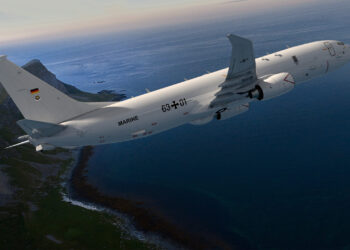Thales,
HENGELO, The Netherlands: Recently, the first SIRIUS Infrared Search and Track system destined for Canada’s Navy was subjected to a Factory Acceptance Test (FAT) at the Thales site in Hengelo, the Netherlands. The test was witnessed by the SIRIUS Program Management Team, DRS Technologies Canada, the Canadian Navy and the Royal Netherlands Navy. DRS is Thales' partner in the SIRIUS program.
The FAT demonstrated that SIRIUS performs as specified, underlining Thales' leading expertise in naval electro-optics world-wide. It further demonstrates Thales’ ability to deliver complex Canadian programs on time and within budget.
The first SIRIUS is intended for the Combat Systems Training Centre (CSTC) of the Canadian Navy, located in Halifax N.S. With Thales support, this system will be integrated into the HALIFAX Class CCS 330 system, with an expected shipboard installation projected in fall 2008 with at sea acceptance trials in early 2009. The second SIRIUS system will be delivered to the Royal Netherlands Navy and will be installed on board HMS Tromp during the summer of 2008.
In concert with the RNNL and the Canadian Navy, the FAT is the conclusion of a long series of tests and qualifications that have been performed over the past few years. They include the cold-water trials at the Royal Netherlands Navy's Land Based Test Site in Den Helder, the Netherlands in 2003, that proved SIRIUS' outstanding long-range detection capabilities; and, the warm-water trials near the Bahamas in 2005 on board the Canadian Halifax Class frigate HMCS Montreal, that demonstrated the SIRIUS system excels in littoral environments.
At present, 17 SIRIUS systems have been ordered: 13 for the Canadian Navy. In addition to the training centre system, 12 more will be installed on the Halifax Class frigates. The remaining four will be installed and integrated on the De Zeven Provinciën class Air Defence and Command frigates of the Royal Netherlands Navy.
This outstanding accomplishment highlights the benefits of long term partnering between industry (Thales / DRS) and Government (Canadian Navy and Royal Netherland’s Navy). Through collaboration, the SIRIUS product will deliver an exceptional operational capability to both navies. The SIRIUS program consistently demonstrates Thales’ ability to meet the Canadian and Netherlands’ Navies requirements in a timely and cost effective means. This is further demonstrated with the recently awarded Fire Control and Surveillance Radar Systems overhaul program for the HALIFAX and IROQUOIS Class.
Sirius is a passive infrared search and track system that operates simultaneously in two wavelengths (3-5 µm and 8-12 µm) and provides long-range surveillance under all atmospheric conditions. As a complement to radar systems, Sirius is an electro-optical surveillance sensor which cannot be detected. In the complex littoral environment Sirius is a perfect source of additional information for the situational awareness on board naval vessels. Video images generated by Sirius support operators with threat classification.
Thales is a leading international electronics and systems group, addressing defence, aerospace and security markets worldwide. Thales’ leading-edge technology is supported by 22,000 R&D engineers who offer a capability unmatched in Europe to develop and deploy field-proven mission-critical information systems. Thales employs 68,000 people in 50 countries with 2007 revenues of EUR 12.3 billion. Thales Nederland, established in 1922, is one of the leading companies in integrated naval systems for surveillance, weapon control, combat management and system integration world-wide.









